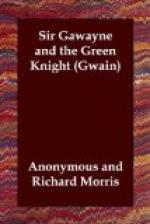[D] Þur3 mony misy & myre, mon al hym one,
Carande for his costes, lest he ne keuer schulde,
To se þe seruy[1] of þat syre, þat on þat self ny3t
752 Of a burde wat3 borne, oure baret to quelle;
[E] & þerfore sykyng he sayde, “I be-seche þe, lorde,
& Mary, þat is myldest moder so dere.
Of sum herber, þer he3ly I my3t here masse.
756 Ande þy matyne3 to-morne, mekely I ask,
& þer-to prestly I pray my pater & aue,
& crede.”
He rode in his prayere,
760 & cryed for his mysdede,
[F] He sayned hym in syþes sere,
& sayde “cros Kryst me spede!”
[Sidenote A: On the morn Sir Gawayne finds himself
in a deep forest,] [Sidenote B: where were old
oaks many a hundred.] [Sidenote C: Many sad birds
upon bare twigs piped piteously for the cold.] [Sidenote
D: Through many a mire he goes, that he may celebrate
the birth
of Christ.]
[Sidenote E: He beseeches the Virgin Mary to
direct him to some lodging
where he may hear mass.]
[Sidenote F: Blessing himself, he says, “Cross
of Christ, speed me!”] [Footnote 1: seruyce
(?).]
XII.
[A] Nade he sayned hym-self, segge,
bot þrye,
764 Er he wat3 war in þe wod of a won in a mote.
[B] Abof a launde, on a lawe, loken vnder bo3e3,
Of mony borelych bole, aboute bi þe diches;
[C] A castel þe comlokest þat euer kny3t a3te,
768 Pyched on a prayere, a park al aboute,
With a pyked palays, pyned ful þik,
Þat vmbe-te3e mony tre mo þen two myle.
Þat holde on þat on syde þe haþel auysed,
772 [D] As hit schemered & schon þur3 þe schyre oke3;
Þenne hat3 he hendly of his helme, & he3ly
he þonke3
Iesus & say[nt] Gilyan, þat gentyle ar boþe,
Þat cortaysly hade hym kydde, & his cry herkened.
[Fol. 101b.]
776 “Now bone hostel,” coþe þe burne,
“I be-seche yow 3ette!”
Þenne gedere3 he to Gryngolet with þe gilt
hele3,
[E] & he ful chauncely hat3 chosen to þe chef
gate,
Þat bro3t bremly þe burne to þe bryge ende,
780 in haste;
[F] Þe bryge wat3 breme vp-brayde,
Þe 3ate3 wer stoken faste,
Þe walle3 were wel arayed,
784 Hit dut no wynde3 blaste.
[Sidenote A: Scarcely had he blessed himself thrice] [Sidenote B: when he saw a dwelling in the wood, set on a hill,] [Sidenote C: the comeliest castle that knight ever owned.] [Sidenote D: It shone as the sun through the bright oaks.] [Sidenote E: Sir Gawayne goes to the chief gate,] [Sidenote F: and finds the draw-bridge raised, and the gates shut fast.]
XIII.
[A] Þe burne bode on bonk, þat
on blonk houed,
Of þe depe double dich þat drof to þe place,
Þe walle wod in þe water wonderly depe,
788 [B] Ande eft a ful huge he3t hit haled vpon lofte,
Of harde hewen ston vp to þe table3,
[C] Enbaned vnder þe abataylment, in þe best
lawe;
& syþen garyte3 ful gaye gered bi-twene,




